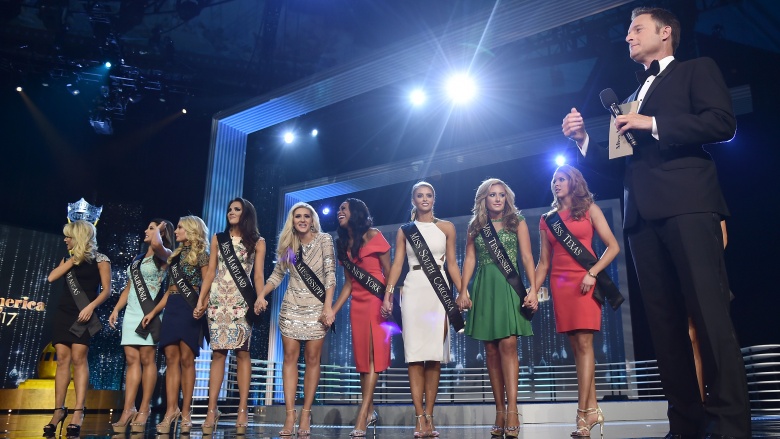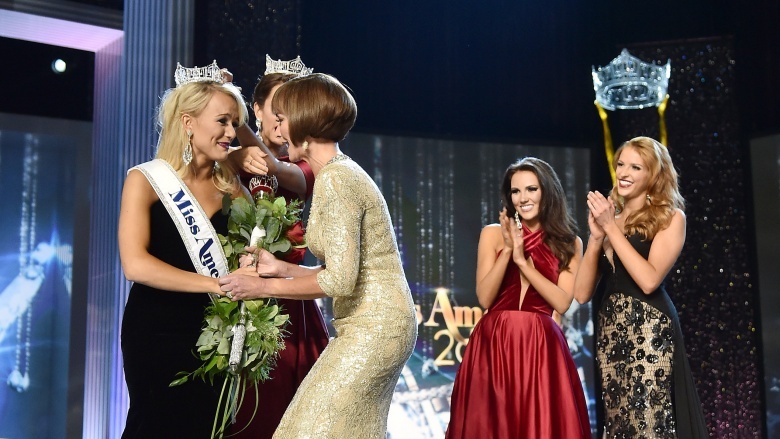Sketchy Things Everyone Just Ignores About Miss America
The Miss America pageant has been an institution since it first began in 1921. But for almost just as long, it has been a source of controversy and the subject of many protests. It seems everyone from religious organizations to feminist groups has a bone to pick with the pageant. We took a closer look at the Miss America competition and discovered some of the shady things people just ignore.
A racist history
Back in the 1930s, an unspoken rule that the competition was only for white women became official. Lenora Slaughter, director of the pageant for 32 years, was responsible for writing the notorious rule number seven, which said, "Contestants must be of good health and of the white race." In fact, back in 1925, African-American women first appeared on the Miss America stage as slaves in a musical performance. Rule seven was abolished in 1940, but it was not until 1970 that Miss Iowa Cheryl Brown, the first black contestant to win at a state level, appeared on the Atlantic City stage. Fourteen years after that, in 1984, Vanessa Williams became the first black Miss America.
Early anti-Semitism
Bess Myerson, the daughter of Russian-Jewish immigrants, became the first Jewish Miss America in 1945. Pageant officials asked her to change her name to "Beth Merrick" to sound less Jewish, but she refused. Her victory tour was cut short because she received few endorsements and couldn't stay at many hotels, which wouldn't accept Jewish guests. Though there are no official restrictions on Jewish contestants entering the competition, no winner since Myerson has been Jewish.
Objectifying women
Many people bristle at the way the Miss America pageant encourages viewers to judge women based on their appearances. While the pageant does include a talent segment and brief question-and-answer session, there's no denying that a pageant is first and foremost about external beauty. Most of the competition is conventionally attractive women modeling various outfits. The competition contributes to the objectification of women because of its focus on how contestants look—the way they style their hair and make-up, what they wear, their figures and how they carry themselves.
In 1968, feminists protested the pageant on the Atlantic City boardwalk, hoping to bring attention to the outdated beauty standards it promoted. About 400 women showed up and threw make-up and household cleaning products into a "freedom trash can." They also put up a banner in the contest hall that said "Women's Liberation." But 50 years later, the pageant still draws millions of viewers each year.
Misleading scholarship promises
The Miss America Foundation claims to be the "largest provider of scholarship assistance to women in the United States," making millions available in scholarships annually. But in reality, the amount they distribute is much lower.
In a segment from September 2014, John Oliver and his team at Last Week Tonight investigated just how much scholarship money the Miss America Foundation really gives out each year. In 2012, according to Oliver, the foundation gave out just $482,000 in cash scholarships, nowhere near the amount "made available." The foundation appears to use shady math to make it seem like they give away more money than they really do. However, Oliver admits the Miss America Foundation still seems to be the largest provider of scholarships exclusively for women.
Excludes married or pregnant women
Since the pageant bills itself as a scholarship competition, it seems strange that some women cannot participate. After 1950, the pageant wasclosed to any woman who had been pregnant or married, but in 1999 those rules were loosened so that women who are not currently pregnant or mothers and are not married at the time of the competition are eligible.
In fact, the designation "Miss" in the title of the pageant suggests that the foundation buys into the idea that something fundamental changes about a woman when she is married. The exclusion of mothers and pregnant women — and the longtime barring of women who had an abortion or miscarriage — may promote a judgmental attitude toward women's sexual histories.
Vanessa Williams was forced to resign
In the summer of 1984, the harsh consequences of the pageant's judgmental attitude toward female sexuality came to light. Vanessa Williams, the first black Miss America, discovered that Penthouse magazine would be publishing nude photos of her against her will. Though the photos were taken before she began her tenure as Miss America, pageant officials insisted that she step down, just a few weeks before the end of her reign. Suzette Charles, Miss New Jersey, took over as Miss America for the rest of the term. For years afterward, Williams' career as an actress and singer suffered. Thirty years later, Vanessa Williams returned as a judge for Miss America 2016, and the organization's CEO publicly apologized to her.
Sued by a songwriter
When it comes to the Miss America pageant, the song that starts "There she is, Miss America" is as iconic as the rows of evening gowns, but it is no longer part of the pageant.
Back in 2012, the estate of Bernie Wayne, who composed the song in 1955, sued the pageant for not licensing the song properly for its 2011 and 2012 events. The case was settled out of court, but ever since then, the song has not been played after the winner is announced.
The CEO and COO are both men
For an organization that claims to promote the interest of women, it is worth noting that the CEO and COO of the company are both men. Sam Haskell III is the Chief Executive Officer, and Josh Randle is the Chief Operating Officer. There are several female board members, but it is undeniable that men are some of the biggest moneymakers from this all-female pageant, which brings questions about the pageant's true goals into sharper focus.
Still going strong
Despite generating so much criticism and controversy over the last century, the Miss America pageant still draws plenty of viewers annually on ABC. Whether it is nostalgia for the heyday of beauty pageants or the simple appeal of attractive women in bikinis, the Miss America pageant seems destined to continue to pull in viewers, even if most Americans no longer believe the winner represents "our ideal."









